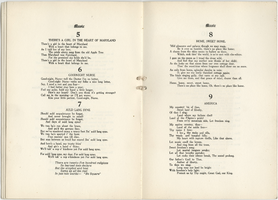Search the Special Collections and Archives Portal
Search Results
Alice P. Broudy Papers on Broudy v. United States
Identifier
Abstract
The Alice P. Broudy Papers on Broudy v United States (1940-2018) comprise materials collected and created by the wife of Charles A. Broudy during her effort to obtain compensation for his death in 1977, which she believed to be a result of repeated radiation exposure. Materials include government documents obtained through the Freedom of Information Act (FOIA), correspondence, memos, litigation papers, scholarly reports and articles on radiation exposure and its effects, congressional testimony, speeches, newspaper clippings, books and audiovisual materials. Also included are photographs, slides, and one box of Alice "Pat" Broudy's personal papers. There are two boxes of papers that remain unprocessed.
Archival Collection
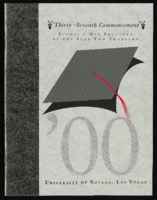
University of Nevada, Las Vegas (UNLV) 37th commencement program
Date
Archival Collection
Description
Commencement program from University of Nevada, Las Vegas Commencement Programs and Graduation Lists (UA-00115).
Text
Terry Wilsey Papers on the Las Vegas, Nevada LGBT Community
Identifier
Abstract
The Terry Wilsey Papers on the Las Vegas, Nevada LGBT Community (1979-2002) are comprised of records from the Las Vegas Gay Switchboard, the Nevadans for Human Rights, and other LGBT community groups based in Las Vegas, Nevada. The collection contains newsletters, agendas and meeting minutes, informational pamphlets, as well as photographs, programs, and a VHS recording of local theatre productions.
Archival Collection
George Laurence Ullom Photograph Collection
Identifier
Abstract
The George Laurence Ullom Photograph Collection (1915-1974) contains photographic prints and negatives created by Las Vegas, Nevada photographer George Laurence "Larry" Ullom. Larry owned and operated Ullom’s Desert Art Studio, which was located in Las Vegas, Nevada. The bulk of the collection consists of Ullom's wedding chapel photography. The collection also includes his photography work for the Bureau of Reclamation, the Agricultural Extension Service, and the Associated Press, Atlantic News, and Acme news bureaus.
Archival Collection
Lori Lipman Brown Papers
Identifier
Abstract
The Lori Lipman Brown Papers date from 1975 to 2009 and document former Nevada State Senator Lori Lipman Brown's political career. It includes correspondence and materials from Brown's service as a Nevada State Senator from 1992 to 1994, case files from her defamation lawsuit against Nevada State Senator Kathy Augustine, and papers from her work opposing the Nevada Question 2 ballot measure on same-sex marriage in 2000. The collection also contains photocopies of biographical materials and personal and publicity photographs of Brown, as well as material from her time working with local high school and commmunity theatre programs.
Archival Collection
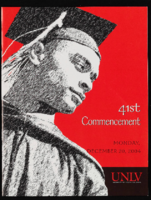
University of Nevada, Las Vegas (UNLV) 41st commencement program
Date
Archival Collection
Description
Commencement program from University of Nevada, Las Vegas Commencement Programs and Graduation Lists (UA-00115).
Text
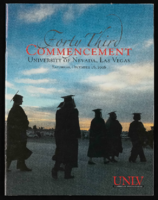
University of Nevada, Las Vegas (UNLV) 43rd commencement program
Date
Archival Collection
Description
Commencement program from University of Nevada, Las Vegas Commencement Programs and Graduation Lists (UA-00115).
Text
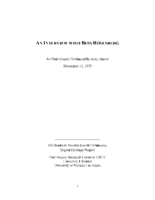
Transcript of interview with Bess Rosenberg by Jerry Masini, November 12, 1975
Date
Archival Collection
Description
Interview with Bess Rosenberg by Jerry Masini on November 12, 1975. In this interview, Rosenberg describes coming to Las Vegas in 1942, and the desert landscape. She gives an in-depth recollection of the first atomic test, and talks about different weather and the seasons in Las Vegas. Rosenberg describes several clubs and hotels around downtown and the recreation at Lake Mead and Mount Charleston.
Text

Meeting minutes for Consolidated Student Senate, University of Nevada, Las Vegas, August 10, 1983
Date
Archival Collection
Description
Text

